by Adult Services Library Associate Beth
“This is a book about man’s war against nature, and because man is part of nature it is also inevitably a book about man’s war against himself.”
Rachel Carson
by Adult Services Library Associate Beth
“This is a book about man’s war against nature, and because man is part of nature it is also inevitably a book about man’s war against himself.”
Rachel Carson
by Adult Services Library Associate Beth
A handful of books published in the past few years illustrate the emergence of a modern anti-monopoly intellectual movement. (‘Monopoly’ referring to the consolidation of market power into one or a small handful of firms/corporations.) Among others, they include: Goliath by Matt Stoller, Break ‘Em Up by Zephyr Teachout, The Curse of Bigness by Tim Wu, and Monopolized by David Dayen (this last book being the subject of this particular review, below).

by Adult Services Library Associate Christian
The legendary Albanian author Ismail Kadare is a prolific writer, having written a great amount of novels, poetry, and essays throughout his tenure in the literary world. His 2008 (translated in 2010 by John Hodgson) novel The Accident is no different to the themes conjured throughout his career—having to do with the fracturing of the Balkans, from the end of the People’s Socialist Republic of Alabania to the balkanizing of Yugoslavia; however, this novel is special in the way that it presents this split in South-Eastern Europe, as the novel is centered around a car crash involving a taxi and the mystery behind the couple in the back seat of this taxi that were in a moment of love or hate.
This novel is an intentional mess of structure, moving from point of views, how the novel is styled, and the time period the events are taken place. This uncompromising novel reflects the fractured Balkans through the 20th century (and early new millennium)—a confusing, traumatic century for the people living in this region. This is represented through the symbolic couple of Besfort Y. and Rovena—a relationship based in lies, cheating, and eventually, separation and death. The history of their relationship is just as confusing as the history of the Balkans.
The story is one that aptly represents a time where the state of the Balkans was up the air, and The Hague, a city in the Netherlands known for its International Court of Justice, became a location all too familiar within the news of political officials of the Balkans (and a location present within the latter half of The Accident).
While the novel does not land entirely on its feet in its pace—its story and structure is something that represents a time of horror and uncertainty through a creative flow. Kadare showcases his original voice in an often-forgotten, but still ever-present moment in history.
You can reserve The Accident on our catalog.
Similar Reads:
The Bridge on the Drina by Ivo Andrić
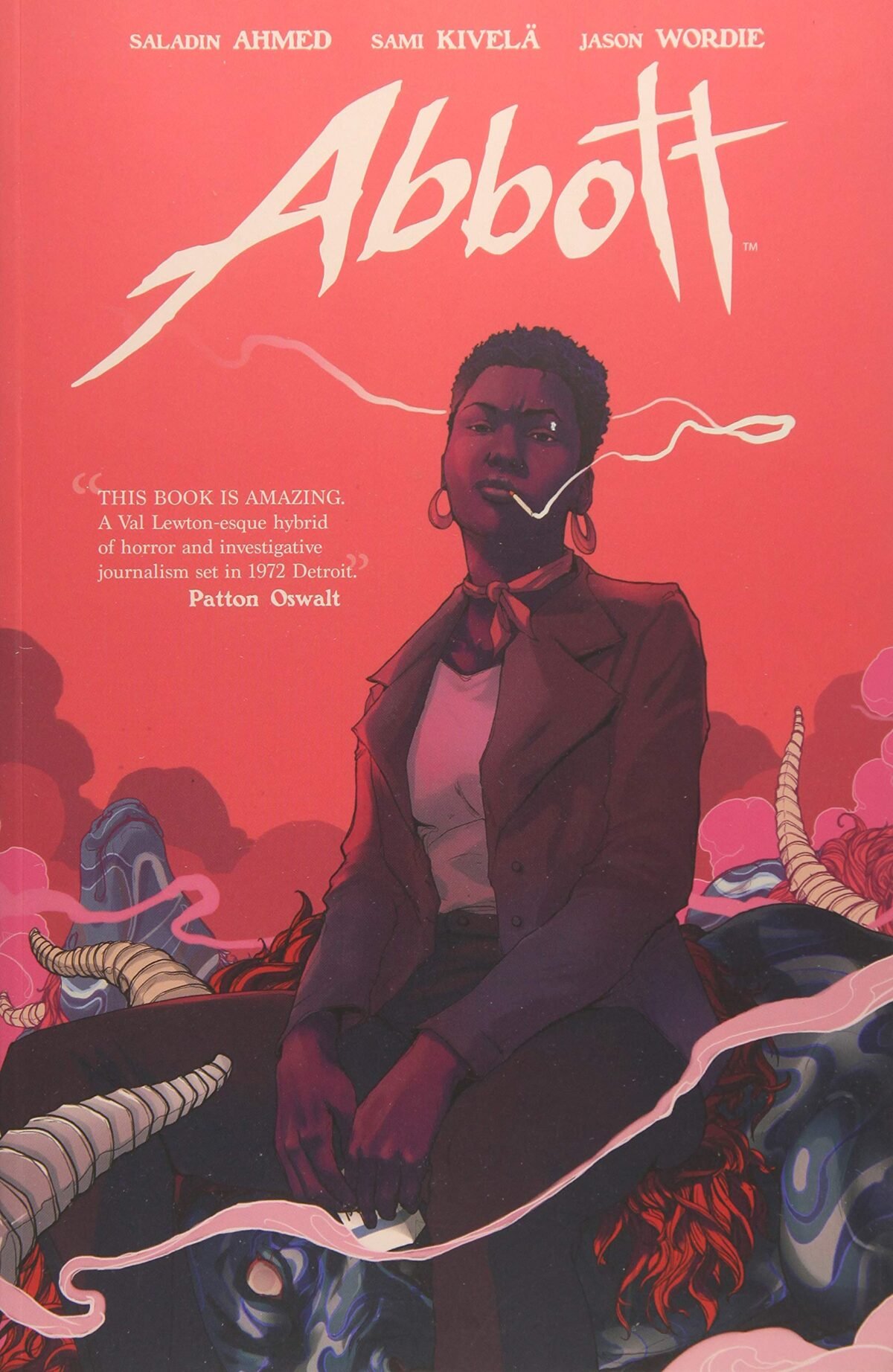
by Adult Services Library Associate Christian
“The trouble with paradise…is that the serpent finds its way in.”
In 1972, the city of Detroit is in a state of pandemonium—in the midst of long-running economic decline, police brutality, and now demonic forces, it is up to the titular journalist, Elena Abbott, to bring a light into this dark world. Abbott, a young, Black woman working for a small newspaper company, reports of a case of police brutality, which puts her reputation as a reporter into question—and as this happens, strange things start developing. The beheading of a horse, dead bodies, the missing son of the owner of a diner she frequents, and a mysterious figure with an ancient mask that corners her in an alley—all things that connect to a conclusion where Abbott must face her past and bring a resolve to the city of Detroit.
What Abbott does in its short, five-issue run is create a sprawling world with so much life and character. It feels like seeing a glimpse of an alternative past, but one that would never be recognized in its time. Although this graphic novel began its run two years ago, it feels more relevant than ever. In her story, Abbott states that the city of Detroit is “an environment that has left many of the city’s residents wondering if any part of Detroit can truly be considered safe.” This is a thought that looms within every conversation Abbott has outside her immediate circle of friends and past lovers and one that rings familiar in the current state of the world.
Abbott was written by Saladin Ahmed, a prominent, new voice in comic books. He has been a writer for a lot of popular characters such as Miles Morales, Black Bolt, and Ms. Marvel. His writing style feels like it captures a world that already exists and continues to exist within this short frame of 100-something pages—and it makes sense as Ahmed has written a novel and poetry. His versatility as a writer shines in this graphic novel by showcasing a level of depth in the world and characters he builds.
This graphic novel was brought to my attention while putting together a list for a recent program that we hosted virtually, “Black Power in Comics”. And I am glad I took the chance to read this short-run comic, as it a story that stuck with me and one I wish had not ended as soon as it has. Abbott feels like it could be an ongoing series, but is serves a purpose in the way that it ends. It is a story that represents something that could not be forged in the decade it is based in and a story that is needed now more than ever.
For more graphic novels like this one, I recommend checking out the rest of the “Black Power in Comics” carousel, found on our Black Lives Matter page.

Happy October, Readers! When October rolls around, I love to wrap up in heart warming stories about witches like Practical Magic or The Physick Book of Deliverance Dane and bone chilling thrillers like Ruth Ware’s The Death of Mrs. Westaway. In this week’s blog post, I’ll highlight five new books that are perfect for the spooky month of October. Enjoy!

Witchcraft is, once again, gaining popularity in mainstream culture as a way for all people to find empowerment. Often, modern witchcraft is framed as a way to focus on self-care and self-improvement. In her latest release, self-proclaimed witch and devotee of the Goddess of Love, Gabriela Herstik has created a series of inspirational and creative prompts that will help readers embrace their inner witch. This is a book for anyone interested in what it means to be a modern witch. The book includes journal prompts, meditations, rituals, and more, all in an effort to help readers better connect to the universe and their inner light.
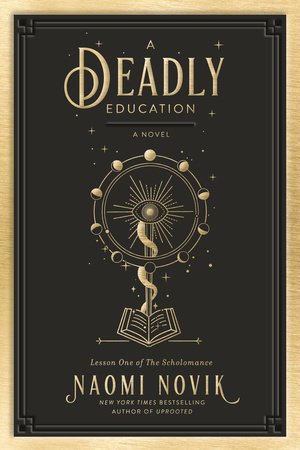
Naomi Novik is known for her fairytale-esque stories like Uprooted and Spinning Silver, which center on powerful women who, after embracing their own power, thrive in the face of adversity. A Deadly Education promises to deliver on Novik’s legacy of complicated, nuanced, powerful women. The book is about a magic, and deadly, school and at its center is an unwilling dark sorceress who is destined to rewrite the rules of magic. Fans of The Magicians trilogy by Lev Grossman, Johnathan Strange and Mr. Norrell by Susanna Clarke, and any of the popular TV shows about magic schools like Netflix’s Chilling Adventures of Sabrina or Freeform’s Motherland: Fort Salem will surely find something to delight in with A Deadly Education.
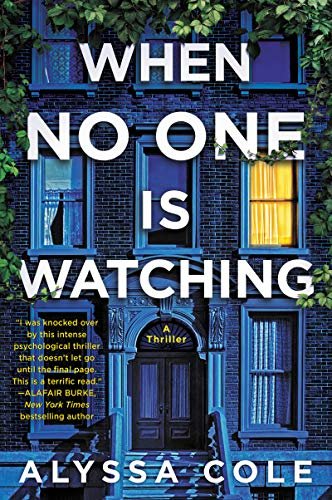
No punches are pulled in Alyssa Cole’s first foray into thrillers and the results are completely engrossing. The lily-white psychological thriller genre welcomes this book as both intense and jaw dropping in turns of jumps and thrills, but also as a clever and insightful commentary on the very real disruption of swiftly gentrifying neighborhoods. Cole uses the genre to deftly illustrate what being displaced through gentrification feels like and how a system of oppression is truly a monster to those within its grasp. When No One is Watching translates the tone and setting of Hitchcock’s Rear Window into Jordan Peele’s Get Out and leaves us with an unapologetic, terrific thriller. And don’t worry, for those fans of Cole’s romance work, she doesn’t leave you high and dry.
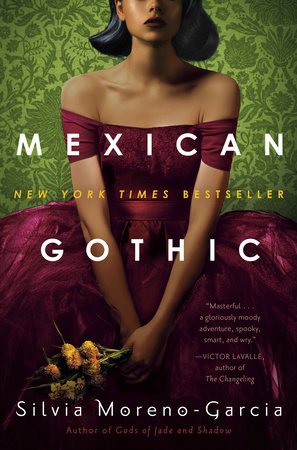
The title doesn’t bury the lede: Mexican Gothic is just that, a gothic supernatural horror set in the hills of Mexico. I hesitate to call the book horror, as it isn’t gory and the vibe is tense and suspenseful more than shocking, but it does have some pretty intense elements and supernatural scenes. The protagonist, a young, smart, glamorous debutante named Noemí travels to the distant countryside after receiving a frantic and cryptic letter from her newly-wed cousin. When she arrives at High Place, a dilapidated old mansion in the hills of a rural town, she finds stories of violence and madness and meets her cousin’s alluring but menacing English husband. The question soon becomes: will Noemí be able to leave High Place? Mexican Gothic is for fans of Daphne Du Maurier’s works like Rebecca or My Cousin Rachel as well as those who loved Get Out or Lovecraft Country.
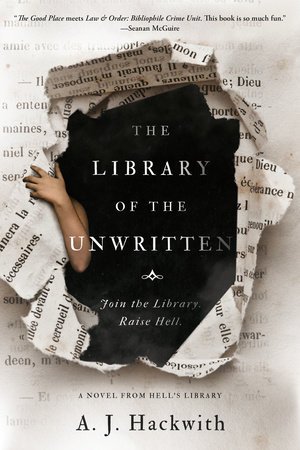

There’s a library, it’s in Hell, and it’s full of books that their authors never finished. Sometimes, characters in those books become restless and escape and the librarian, with the help of a demon and a muse, must track them down. At least, that’s how things work in the first installment of the Hell’s Library’s books, The Library of the Unwritten by A.J. Hackwith. Saying she is, “Certainly not an ink witch in a hoodie,” Hackwith is a queer writer of fantasy and science fiction and writes sci-fi romance as Ada Harper. In the second installment of Hell’s Library books, released this year, after a war between Heaven and Hell, mysterious and nefarious ink has started to pour out of some of the volumes in Hell’s library and the librarian, demon, muse, and this time also an angel, must investigate. Fans of the TV show or Marvel comic Lucifer, the books and subsequent TV show A Discovery of Witches, and the books The Bear and the Nightingale, and Uprooted will likely enjoy this series.
by Adult Services Librarian Jeff

The Overstory by Richard Powers is a lot of things, possibly too many, at once. But perhaps its most impressive achievement is how it decenters the human experience while simultaneously unfurling a compelling, complex, and ultimately human storyline via its nine main characters. Being a work of environmental fiction, and in particular being tree-centric, it’s not farfetched to expect a fairly breezy, peaceful read with the end result of appreciating nature a bit more. In reality, The Overstory is fraught with traumatic events and incisive critiques of our relationship with nature.
The Overstory is split into four sections: Roots, Trunk, Crown, and Seeds. In Roots, each of the main characters are introduced via a short story-esque passage that ultimately reveals the role trees play (or have played) in their lives. These range all the way from a dendrologist (someone who studies trees/wooded plants) to a young couple who, for much of their lives, don’t pay any attention to trees. In the book’s second section, Trunk, the narrative hops between storylines and the characters’ stories intertwine in various interesting ways, primarily by means of environmental activism. In Crown and Seeds, the fallout from the narrative climax unravels and the story draws to a close.
Tonally, The Overstory is alternately enchanting and disheartening. Passages describing the social nature of trees and how they communicate with one another inspire awe, but this awe is quickly eroded when reading about the sobering environmental devastation of logging, particularly in old-growth areas like the redwood forests in California. This frames one of the central conflicts of the book: environmental activists versus logging companies. And as the book is set in capitalist America, the victor of these confrontations isn’t exactly a surprise.
It’s difficult to overstate just how much is packed into the 500 or so pages of The Overstory. Existential meditations about humanity’s place on Earth, ruminations on the future of artificial intelligence- it is truly much more than a book about trees. Because of this, the book can teeter toward melodrama, and it loses a bit of steam toward the end. It can also be an exceptionally difficult read emotionally, as a human being and as a consumer. However, in a time where the consequences of climate change ominously loom in our everyday lives, the perspective Richard Powers offers is both welcome and utterly paramount.
For fans of Literary Fiction and Environmental Fiction, including Greenwood by Michael Christie and Prodigal Summer by Barbara Kingsolver
You can request The Overstory digitally through Overdrive, or request a physical copy or audiobook through the BPL catalog.
by Adult Services Library Associate Christian
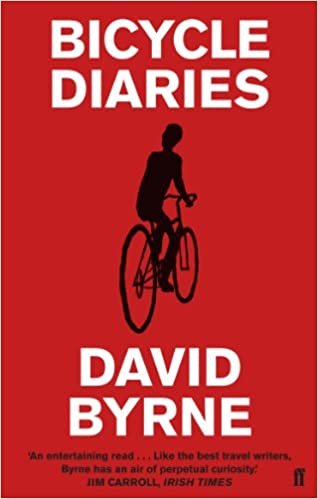
“Find a city. Find myself a city to live in.”
Is what David Byrne yelps in the song “Cities” off of Talking Heads’s classic 1979 record, Fear Of Music. And similarly to the tune of his band’s hit song, he lives through the cities of the world in his 2009 book Bicycle Diaries. Inspired by the works of W.G. Sebald and tour life, Bicycle Diaries, is a reflection of viewing different parts of the world through the most quick and reflective mode of transportation, a bicycle. The diaries contain Byrne’s views on urban infrastructure, bicycling, Robert Moses, the history and culture of the respective cities, and so much more.
by Adult Services Library Associate Beth
So you’ve just finished reading The Yellow House by Sarah M. Broom, and wonder, “What’s next?” Well, first things first: register for one of the BPL Virtual Book Club discussions, scheduled for August 12th at 7pm and August 15th at 11:30am! Also, be sure to check out the BPL-hosted lecture and discussion with Dr. Hasan Kwame Jeffries of OSU about the intersections of race, class, and Hurricane Katrina. Find this recorded discussion on our Facebook page, YouTube, or the audio version on Podbean.
And after that, if you’re interested in further exploring some of the themes and topics discussed in the book, check out this short list of recommended things to read, watch and listen to. Note that this list includes only things from my own media bubble that I have read, etc., so it is in no way comprehensive. Further, there are many, many other themes this does not cover (issues such as environmental racism/classism and gentrification, just to name a few), so it barely even scratches the surface. But, as always, you can ask BPL librarians for more recommendations on these and related topics!
“The case of the Willow Street house did not come up again, but I continue to think of it as strange irony for Mom who, of all the things she ever desired, wanted to make a new world with Ivory Mae rules. That is what it meant for her to own a house.”
Sarah M. Broom, The Yellow House
“It was clear that the French Quarter and its surrounds was the epicenter. In a city that care supposedly forgot, it was one of the spots where care had been taken, where the money was spent. Those tourists passing through were the people and the stories deemed to matter.”
Sarah M. Broom, The Yellow House
“The government-funded Road Home, intended as a path back into lost homes for the displaced, was frozen in bureaucracy amid heated debates and politicizing about which areas of the city were worth rebuilding.”
Sarah M. Broom, The Yellow House
“This story, that the levees were blown, the poorest used as sacrificial lambs, would survive and be revived through the generations.”
Sarah M. Broom, The Yellow House
The following explore the politics, failures, and inequities of levee systems across cities in Missouri and Illinois. The last article also explores how climate change, by contributing to rising sea levels and the loss of wetlands in Louisiana, will mean increasing the frequency and destructive capacity of flooding.
What would you recommend to fellow readers of The Yellow House? Leave a comment on the social media post to share with the library community!
by Adult Services Library Associate Debbie
One of the best problems to have is too many wonderful books to read. For a bookworm like myself to work in a library is a bit like being a kid in a candy store. I have bunches of books I’m looking forward to reading and I thought I would share a few of them.
I’ve been meaning to read one of Laura Zigman’s books forever- she has a great reputation for writing funny, poignant novels with very relatable characters. I was hooked after I read the premise for Separation Anxiety – a middle aged Mom who suddenly, impulsively starts wearing an old baby sling and carrying the family dog around in it to the shock and surprise of her family and friends.
Speaking of hooks, I’m a fool for a good book hook and Darling Rose Gold by Stephanie Wrobel has a doozy. Rose Gold Watts was terribly sick for the first eighteen years of her life and the doctors couldn’t figure out what was wrong with her. But it turns out that nothing was – her Mother was just a really good liar. Now her Mother is getting out of prison and the town is stunned when Rose Gold opens her home to her. Has her Mother forgiven Rose for testifying against her? But Rose is no longer an invalid and she has been waiting such a long time for her Mother to come home. It gives me chills! I’m eager to see if Darling Rose Gold delivers the psychological twists and turns that it promises.
Long Bright River by Liz Moore is a mystery novel about two sisters; Mickey is a cop and patrols the streets and Kasey is in the grip of addiction and lives on the streets. The two sisters are estranged but when Kasey disappears Mickey is driven to find her. I enjoy mysteries and this type really appeals to me – soulful, thoughtful mysteries that delve deep into their characters. The central mystery isn’t as important as the mystery in the hearts of the characters.
The cover for Recipe for a Perfect Wife by Karma Brown made me do a double take – red cover, 1950s image of a housewife holding a knife and teeny little skulls. I couldn’t resist. The story of Alice,a modern day woman who finds cookbook notes and letters from a 1950s housewife – the cookbook has a sunny, perfect housewife outlook and the letters tell the real, darker side of her story. Alice starts to see uncomfortable parallels between her life and that of the ‘50s housewife who felt suffocated by her role and her marriage. Will Alice change her life? The little skulls hint that the solution might be darker than simple self-improvement. There is only one way to find out!
A delightful summer treat that I’m about to bite into is Take a hint, Dani Brown by Talia Hibbert. This novel is the second in a rom-com series about three sisters; the first one Get a Life, Chloe Brown was the perfect romantic confection – lovable characters, witty banter, adorable moments and great sizzle and I’m hoping the second is as good as the first. In the second novel Danika Brown is a hyper focused PhD student and has given up on relationships aside from the occasional fling; big, brooding security guard and former rugby star Zafir Ansari is a secret romantic and a workplace fire drill gone wrong throws the two together. Will Dani seduce Zaf? Will Zaf win over Dani to romance? I can barely wait to find out!
I hope you’re enjoying your own summer reads and as always, Happy Reading!





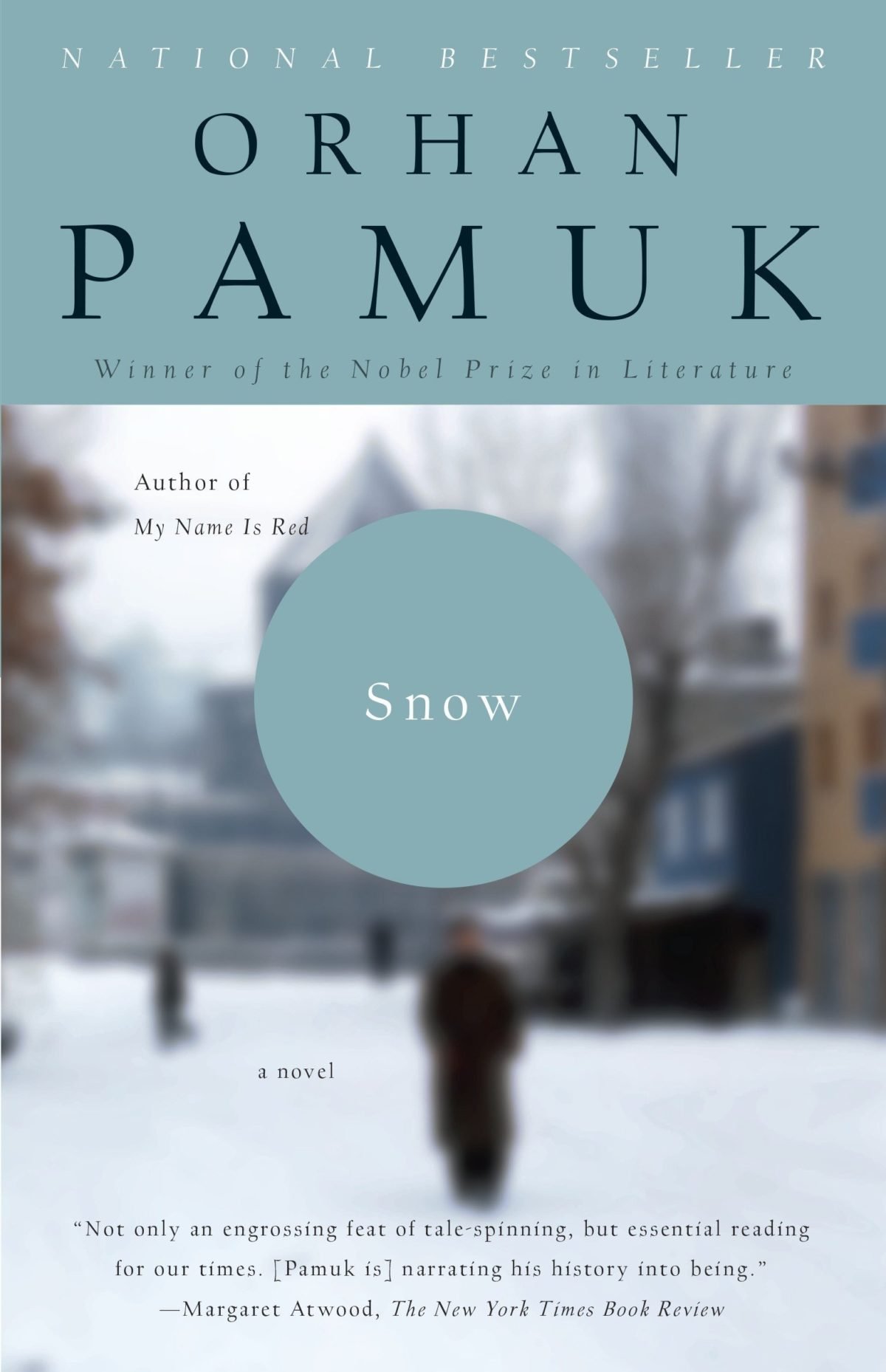
The city of Kars, Turkey is like a winter snow globe constantly being shook by the hands of geopolitical affairs and religious tension. As the snow falls, covering the city with suicides of teenage girls, Ka, a poet, returns to Kars to write on the suicides of the alienated youth. Orhan Pamuk’s Snow is a novel that resembles his literary contemporary, Roberto Bolaño’s 2666, and David Lynch’s Twin Peaks–in the way that Snow takes place in clone of a city where real crimes have occurred (Kars being the placeholder for the suicides of girls in Batman, Turkey in Snow and Santa Teresa being the placeholder for the murders of women in Cuidad Juarez in 2666) and the mysticism of a location (such as the dream-like qualities that resemble the cities of Kars, Turkey and Twin Peaks, Washington).